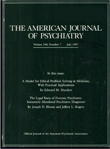The Defeat Depression Campaign: psychiatry in the public arena
Abstract
OBJECTIVE: The adequate recognition and treatment of depression are inhibited by negative public attitudes and gaps in professional expertise. This paper describes the activities and efforts of the Defeat Depression Campaign, a joint activity of the Royal College of Psychiatrists and the Royal College of General Practitioners, in the United Kingdom. METHOD: A 5-year campaign was undertaken from 1992 to 1996, aimed at enhancing public awareness and attitudes and providing professional education. RESULTS: An informational media campaign directed toward the general public was successfully undertaken. Leaflets, books, and audiotapes were also prepared and distributed to the public. Multiprofessional conferences on specific aspects of depression were organized. An extensive program of general practice education included consensus conferences and statements, recognition and management guidelines, training videotapes, and other publications. Public attitudes were found to be relatively favorable, except attitudes toward antidepressants, which were viewed as addictive. A general consequence of the campaign was the development of much additional public material and professional education not directly originating from the campaign. Aspects of the campaign are being evaluated, including public attitude change, impact of educational materials on general practitioners, and prescription of antidepressants. CONCLUSIONS: A campaign of this kind serves a useful function in enhancing public education and awareness and improving professional recognition and management of depression.



